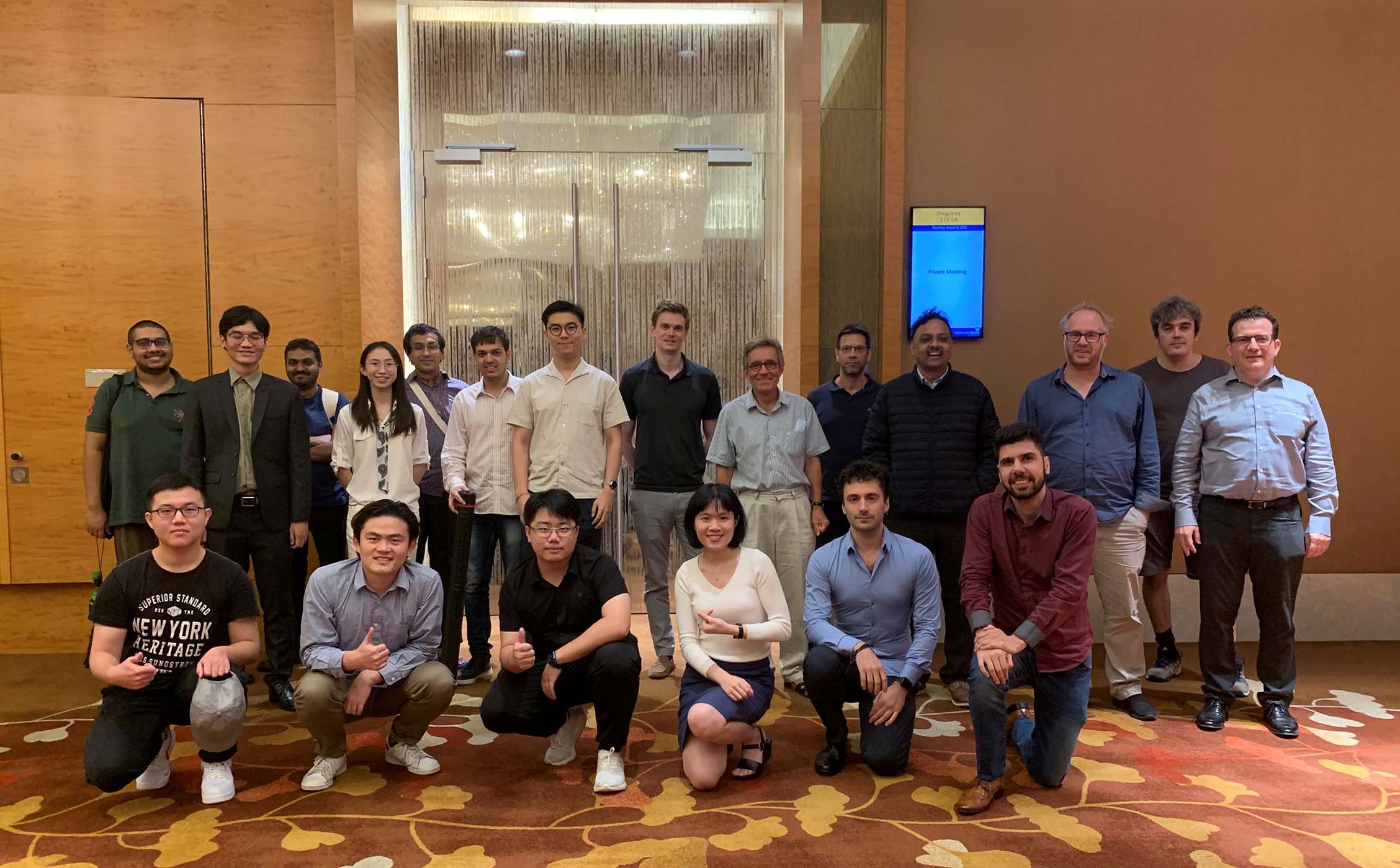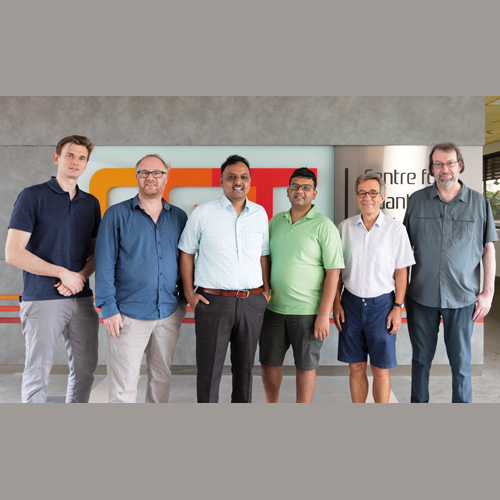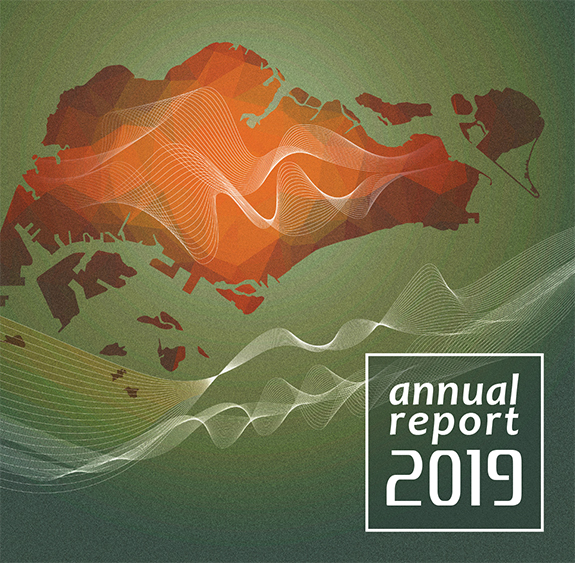Computer Science Group
The computer science group's activity covers a wide range of areas in quantum computing and information theory, often in close connection with related research areas in classical theoretical computer science. We investigate quantum algorithms, complexity and quantum-safe cryptography. Quantum algorithms provide a recipe for efficiently solving practical problems on a quantum computer, of particular interest are problems which are difficult to solve on classical hardware. The study of quantum computational complexity is about understanding the fundamental limitations of information processing tasks in nature. By understanding such limits, it can offer a guide to crafting new algorithms and communication protocols. Quantum-safe cryptography is concerned with the design and the evaluation of cryptographic systems which are resistant even to quantum attacks.
More information at our homepage: http://cs.quantumlah.org/
Group Members

- Divesh AggarwalPrincipal Investigator
- Patrick RebentrostPrincipal Investigator
- Marco TomamichelPrincipal Investigator
- Miklos SanthaPrincipal Investigator
- Rahul JainPrincipal Investigator
- Dmitry GavinskyVisiting Senior Research Fellow
- Erkka HaapasaloSenior Research Fellow
- Itai AradResearch Associate Professor
- Alessandro LuongoResearch Fellow
- Chakraborty SayantanResearch Fellow
- Cheng BinResearch Fellow
- Dinh-Long VuResearch Fellow
- El Amine CherratResearch Fellow
- Ian Thomas GeorgeResearch Fellow
- Lirande PiraResearch Fellow
- Milad Moazami GoodarziResearch Fellow
- Pan FengResearch Fellow
- Qin MinglongResearch Fellow
- Rajeevalochana Mysore RaghunathResearch Fellow
- Rucha Ravi KulkarniResearch Fellow
- Sayantan SenResearch Fellow
- Soumik AdhikaryResearch Fellow
- Wu JiaweiResearch Fellow
- Bao JingeResearch Assistant
- Chen HaotianResearch Assistant
- Li ZeyongResearch Assistant/CQT PhD Student
- Liao YidongResearch Assistant
- Nayanthara Prathap MenonResearch Assistant
- Aditya MoroliaCQT PhD Student
- Batra RishabhCQT PhD Student
- Chen ZhiliCQT PhD Student
- Enrique CerveroCQT PhD Student
- Frits VerhagenCQT PhD Student
- Gan Beng YeeCQT PhD Student
- Guo NaixuCQT PhD Student
- Hu YanglinCQT PhD Student
- Josep Lumbreras ZarapicoCQT PhD Student
- Kelvin Koor Kai JieCQT PhD Student
- Li XiufanCQT PhD Student ÃÂ
- Ananta Mukherjee CQT PhD Student Â
- Philippe Tristan EmmanuelCQT PhD Student
- Qiu YixianCQT PhD Student
- Rishav GuptaPhD Student
- Roberto RubboliCQT PhD Student
- Yu ZhanCQT PhD Student
- Zhang YaonanCQT PhD Student
- Mario BertaVisiting Research Associate Professor
- Serge MassarVisiting Research Professor
- Troy LeeVisiting Research Associate Professor
- Golovnev AleksandrVisiting Senior Research Fellow
- Noah Stephens-DavidowitzVisiting Research Fellow
- Antoine JouxResearch Affiliate
- Iordanis KerenidisResearch Affiliate
Recent papers

- Michael X. Cao, R. Jain, M. Tomamichel. (2024). Quantum Channel Simulation under Purified Distance is no more difficult than State Splitting. Proceedings of ISIT 1421-1425

- J. Lumbreras, M. Tomamichel. (2024). Linear bandits with polylogarithmic minimax regret. Proceedings of Conference on Learning Theory 247 39

- M. Tomamichel, C. Hirche. (2024). Quantum Rényi and f-divergences from integral representations. Comm. Math. Phys. 405 52

- Y.L.Hu, M. Tomamichel. (2024). Fundamental limits on quantum cloning from the no-signalling principle. Phys. Rev. A 109

- Mario Berta, M. Tomamichel. (2024). Entanglement monogamy via multivariate trace inequalities. Comm. Math. Phys. 405

- Shrigyan Brahmachari , J. Lumbreras, M. Tomamichel. (2024). Quantum contextual bandits and recommender systems for quantum data. Quantum Machine Intelligence 6 13

- Marco Fanizza, J. Lumbreras, Andreas Winter. (2024). Quantum theory in finite dimension cannot explain every general process with finite memory. Comm. Math. Phys. 405

- Mario Berta, Fernando G. S. L. Brandão, Gilad Gour, Ludovico Lami, Martin B. Plenio, Bartosz Regula, M. Tomamichel. (2023). The tangled state of quantum hypothesis testing. Nature Physics

- Giovanni Chesi, Alberto Riccardi, R. Rubboli, Lorenzo Maccone, Chiara Macchiavello. (2023). A protocol for global multiphase estimation. Phys. Rev. A 108 012613

- C. Hirche, Xinyue Guan, M. Tomamichel. (2023). Chain Rules for Renyi Information Combining. IEEE International Symposium on Information Theory (ISIT)

- Kaumudibikash Goswami, Jacquiline Romero, Barry C. Sanders, Min-Hsiu Hsieh, M. Tomamichel, Y. Ouyang. (2023). Approximate reconstructability of quantum states and noisy quantum secret sharing schemes. Phys. Rev. A 108

- Mario Berta, Fernando G. S. L. Brandão, Gilad Gour, Ludovico Lami, Martin B. Plenio, Bartosz Regula, M. Tomamichel. (2023). On a gap in the proof of the generalised quantum Stein\'s lemma and its consequences for the reversibility of quantum resources. Quantum 7 1103

- E. Cervero, Kirill Plekhanov, Michael Lubasch. (2023). Barren plateaus in quantum tensor network optimization. Quantum 7 974

- M. X. Cao, M. Tomamichel. (2023). Comments on ââ¬ÅChannel Coding Rate in the Finite Blocklength Regimeââ¬Â: On the Quadratic Decaying Property of the Information Rate Function. IEEE Trans. Inf. 69

- Y.L.Hu, Y. Ouyang, M. Tomamichel. (2023). Privacy and correctness trade-offs for information-theoretically secure quantum homomorphic encryption. Quantum 7 976














